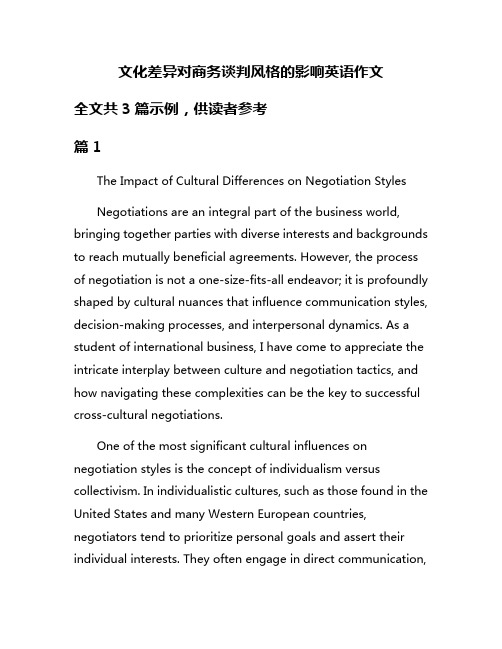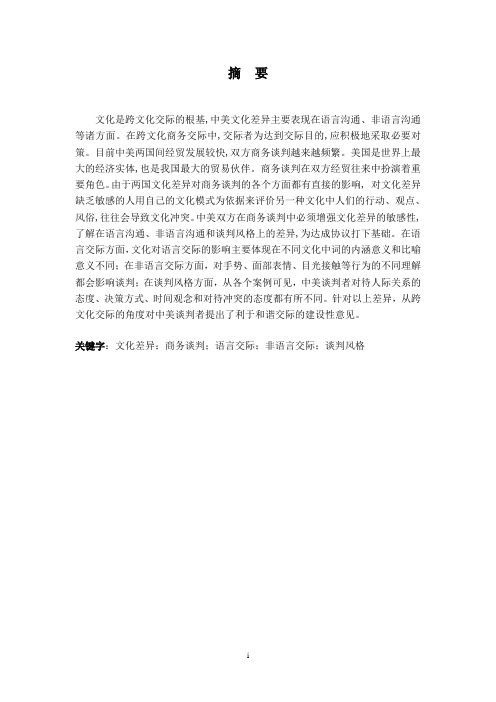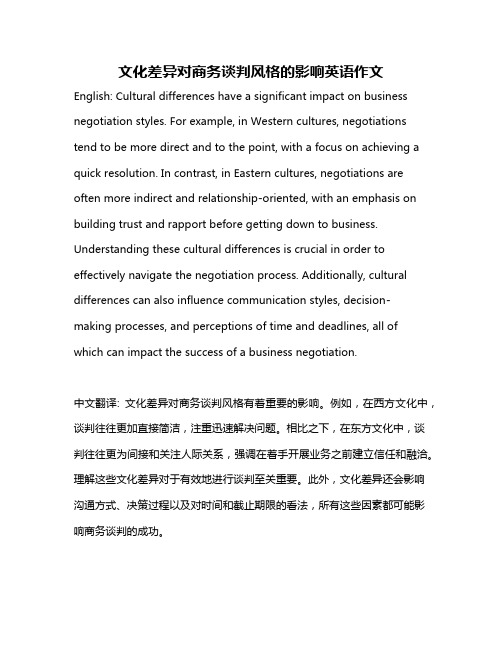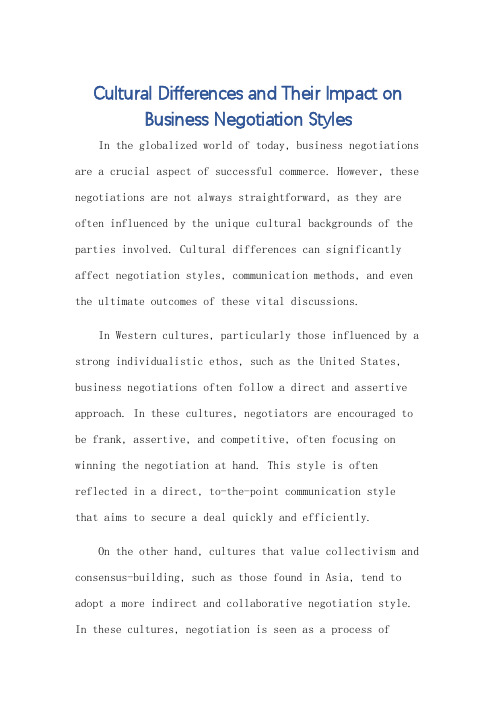(全英文论文)文化差异对商务谈判思维的影响
文化不差异在商务中的重要性英语作文

文化不差异在商务中的重要性英语作文English: The importance of cultural differences in business cannot be overstated. In today's globalized world, where businesses are expanding their reach beyond domestic borders, it is crucial to understand and appreciate the cultural nuances of the markets they operate in. Cultural differences impact various aspects of business including communication styles, negotiation tactics, and business etiquette. The ability to navigate and respect cultural differences can often make or break a business deal. A lack of understanding or sensitivity towards cultural differences can lead to misunderstandings, conflicts, and ultimately hinder business relationships and opportunities.中文翻译: 文化差异在商务中的重要性不言而喻。
在当今全球化的世界,企业正在超越国内边界拓展业务,了解和欣赏所经营市场的文化细微差别至关重要。
文化差异会影响商务的各个方面,包括沟通风格、谈判策略和商务礼仪。
能够应对和尊重文化差异往往能决定商业交易的成败。
文化差异对国际商务谈判的影响

英语专科毕业作业文化差异对国际商务谈判的影响Impacts of Cultural Differences on International Business Negotiation姓名: 张雪瑜学号: 1044001401561班级: 10春商务英语专科晚班指导教师: 王卫林目录一.摘要 1二.中文译文 21.文化差异类型 21.1价值观 21.2谈判风格 21.3思维模式 22.文化差异对国际商务谈判的影响 32.1价值观差异对国际商务谈判的影响 32.1.1时间观差异对谈判的影响 32.1.2平等观的差异对谈判的影响 32.1.3客观性的差异对谈判的影响 42.2谈判风格的差异对国际商务谈判的影响 42.3思维模式的差异对国际商务谈判的影响 43.跨文化谈判的应对策略 53.1谈判前的准备工作 53.2克服文化偏见 53.3征服沟通障碍 54.结论 6 三.原文网页7四.英文原文81. Types of Cultural Differences 81.1 Value View 81.2. Negotiating Style 91.3. Thinking Model 92. Impact of Cultural Differences on International Business Negotiations 92.1 Impact of Value Views Differences on International Business Negotiations 102.1.1 Impact of Time View Difference on Negotiation 10 2.1.2 Impact of Equality View Difference on Negotiation 11 2.1.3 Impact of Objectivity Difference on Negotiation 11 2.2 Impact of Negotiating style Differences on International Business Negotiations 122.3 Impact of Thinking Model Differences on International Business Negotiation 133. Coping Strategy Of Negotiating Across Cultures 13 3.1 Making Preparations before Negotiation 13 3.2 Overcoming Cultural Prejudice 143.3 Conquering Communication Barriers 144. Conclusion 15 五.工具书16不同文化条件下的商务谈判就是跨文化谈判。
文化差异对商务谈判风格的影响英语作文

文化差异对商务谈判风格的影响英语作文全文共3篇示例,供读者参考篇1The Impact of Cultural Differences on Negotiation StylesNegotiations are an integral part of the business world, bringing together parties with diverse interests and backgrounds to reach mutually beneficial agreements. However, the process of negotiation is not a one-size-fits-all endeavor; it is profoundly shaped by cultural nuances that influence communication styles, decision-making processes, and interpersonal dynamics. As a student of international business, I have come to appreciate the intricate interplay between culture and negotiation tactics, and how navigating these complexities can be the key to successful cross-cultural negotiations.One of the most significant cultural influences on negotiation styles is the concept of individualism versus collectivism. In individualistic cultures, such as those found in the United States and many Western European countries, negotiators tend to prioritize personal goals and assert their individual interests. They often engage in direct communication,express disagreement openly, and strive for tangible, measurable outcomes that benefit themselves or their organization. Conversely, in collectivistic cultures prevalent in parts of Asia, Africa, and Latin America, negotiators place greater emphasis on group harmony, face-saving, and maintaining strong interpersonal relationships. They may adopt a more indirect communication style, avoid confrontation, and seek outcomes that benefit the collective rather than solely individual gains.This contrast in cultural values can lead to significant differences in negotiation approaches. For instance, in individualistic cultures, negotiations may be more transactional, with a focus on achieving specific terms and conditions. In contrast, in collectivistic cultures, the negotiation process itself is often viewed as an opportunity to build trust and establish long-term relationships, with the specific deal terms being secondary.Another critical cultural dimension that influences negotiation styles is the concept of power distance, which refers to the extent to which members of a society accept and expect unequal distributions of power. In high power distance cultures, such as those found in many Asian and Middle Eastern countries, hierarchical structures and authority figures are highly respected.Negotiators from these cultures may defer to those in positions of power and may be more comfortable with top-down decision-making processes. Conversely, in low power distance cultures, like those found in countries like Denmark, Sweden, and New Zealand, there is a greater emphasis on egalitarianism and participative decision-making. Negotiators from these cultures may be more comfortable challenging authority and may expect a more collaborative approach to negotiations.Time orientation is another cultural factor that can significantly impact negotiation styles. In cultures with a more future-oriented perspective, such as those found in many Western countries, negotiators may prioritize efficiency and strive to reach agreements quickly. They may also place greater emphasis on long-term planning and strategic considerations. In contrast, in cultures with a more present-oriented orpast-oriented perspective, such as those found in parts of Africa, the Middle East, and Latin America, negotiators may be more focused on building relationships and establishing trust in the present moment, with less emphasis on strict timelines orlong-term planning.Beyond these broad cultural dimensions, there are also numerous specific cultural norms and practices that caninfluence negotiation styles. For example, in some cultures, silence during negotiations is seen as a sign of respect and contemplation, while in others, it may be interpreted as a lack of interest or engagement. Similarly, the use of nonverbal cues, such as gestures, eye contact, and physical proximity, can carry vastly different meanings across cultures, potentially leading to misunderstandings or miscommunications during negotiations.Navigating these cultural complexities requires a deep understanding and appreciation of the diverse perspectives and communication styles at play. Effective cross-cultural negotiators must be adept at recognizing and adapting to these differences, while also remaining true to their own cultural values and norms. This may involve adjusting communication styles,decision-making processes, and even negotiation strategies to better align with the cultural expectations of their counterparts.For example, when negotiating with a counterpart from a collectivistic culture, it may be beneficial to invest time in building personal relationships and establishing trust before delving into substantive negotiations. Additionally, adopting a more indirect communication style and emphasizing the potential benefits to the collective group, rather than solely individual gains, can be an effective strategy.Conversely, when negotiating with a counterpart from an individualistic culture, a more direct and transactional approach may be more appropriate, with a greater focus on achieving specific, measurable outcomes that benefit the individual parties involved.Ultimately, successful cross-cultural negotiations require a delicate balance of cultural awareness, adaptability, and strategic decision-making. It is essential to approach negotiations with an open mind, a willingness to learn and adapt, and a genuine respect for the cultural perspectives of one's counterparts.As a student of international business, I have come to recognize the profound impact that cultural differences can have on negotiation styles and outcomes. By developing a deep understanding of these cultural nuances and cultivating the skills necessary to navigate them effectively, we can not only enhance our negotiation capabilities but also foster greater cross-cultural understanding and cooperation in the global business landscape.篇2The Impact of Cultural Differences on Business Negotiation StylesIn today's increasingly globalized business world, negotiating across cultures has become an integral part of conducting international transactions and fostering successful partnerships. Cultural disparities can significantly shape communication styles, decision-making processes, and strategies employed during negotiations. As a student aspiring to a career in the business realm, understanding the nuances of cross-cultural negotiation is paramount to navigating the intricate landscape of global commerce effectively.Culture, a multifaceted concept encompassing values, beliefs, attitudes, and behaviors, profoundly influences how individuals perceive and approach negotiations. One of the most notable cultural dimensions that impact negotiation styles is the distinction between individualistic and collectivistic societies. Individualistic cultures, such as those found in the United States and Western Europe, tend to prioritize personal goals, direct communication, and assertive bargaining tactics. Negotiators from these cultures often aim to achieve the best possible outcome for themselves, emphasizing competition and individual interests.In contrast, collectivistic cultures, prevalent in parts of Asia, Latin America, and Africa, place a greater emphasis on groupharmony, indirect communication, and a more cooperative approach to negotiations. Representatives from these societies typically strive to maintain relationships and avoid confrontation, valuing compromise and consensus-building over outright competition. Understanding these contrasting orientations is crucial for effective cross-cultural negotiations, as it can help bridge gaps in communication and facilitate mutual understanding.Another significant cultural dimension that shapes negotiation styles is the concept of power distance, which refers to the extent to which individuals accept and expect unequal power distribution within hierarchical structures. Cultures with high power distance, such as those found in many Asian and Latin American countries, tend to exhibit a more formal and hierarchical approach to negotiations. Decisions are often made by those in positions of authority, and negotiators from these cultures may be less inclined to challenge or contradict their superiors.Conversely, cultures with low power distance, like those found in Northern Europe and parts of North America, tend to adopt a more egalitarian and participative negotiation style. Negotiators from these cultures are more likely to voice theiropinions openly, challenge assumptions, and engage in frank discussions, regardless of hierarchical positions.Time orientation is another cultural factor that can significantly impact negotiation styles. Cultures with a more short-term orientation, such as those found in parts of the United States and Western Europe, tend to priorit篇3The Impact of Cultural Differences on Negotiation StylesNegotiation is a crucial aspect of any business transaction, and the ability to negotiate effectively can often make or break a deal. However, negotiation styles can vary significantly across cultures, and understanding these differences is essential for successful cross-cultural negotiations. In this essay, we will explore the impact of cultural differences on negotiation styles and how these differences can be navigated to achieve mutually beneficial outcomes.One of the most significant cultural differences in negotiation styles is the emphasis placed on individualism versus collectivism. In individualistic cultures, such as those found in the United States and Western Europe, negotiators tend to prioritize individual interests and goals. They are often more direct in theircommunication and more willing to engage in confrontational tactics. In contrast, negotiators from collectivistic cultures, such as those found in many Asian and Latin American countries, tend to prioritize group interests and harmony. They may be more indirect in their communication and place a greater emphasis on building relationships and saving face.Another key cultural difference in negotiation styles is the attitude towards time and deadlines. In some cultures, such as those found in Northern Europe and the United States, time is viewed as a valuable commodity, and punctuality and adherence to deadlines are highly valued. Negotiators from these cultures may become impatient if negotiations drag on for too long or if deadlines are not met. In contrast, negotiators from cultures with a more relaxed attitude towards time, such as those found in Latin America and parts of Asia, may view deadlines as more flexible and may be more willing to take their time in negotiations.The importance of personal relationships in negotiations is another area where cultural differences can play a significant role. In many collectivistic cultures, such as those found in Asia and Latin America, personal relationships are highly valued, and building trust and rapport is essential for successful negotiations.Negotiators from these cultures may spend a significant amount of time getting to know their counterparts and building personal connections before delving into the substantive issues. In contrast, negotiators from individualistic cultures may place less emphasis on personal relationships and may be more focused on the specific terms and conditions of the deal.Cultural differences can also impact the communication styles used in negotiations. In some cultures, such as those found in Northern Europe and the United States, direct and explicit communication is preferred, with negotiators stating their positions and interests clearly and directly. In other cultures, such as those found in Asia and parts of the Middle East, indirect and implicit communication is more common, with negotiators using subtle cues and nonverbal communication to convey their messages.Furthermore, cultural differences can influence the decision-making processes used in negotiations. In some cultures, such as those found in Western Europe and North America, decision-making tends to be more centralized, with a small group of individuals or a single individual having the authority to make decisions. In other cultures, such as those found in Asia and parts of Africa, decision-making may be moredecentralized, with input and consensus sought from a larger group of stakeholders.To navigate these cultural differences successfully, it is essential for negotiators to develop cultural intelligence and sensitivity. This involves not only understanding the cultural norms and practices of their counterparts but also being able to adapt their own behavior and communication styles to bridge the cultural gaps.One effective strategy for navigating cultural differences in negotiations is to conduct thor。
(全英文论文)文化差异对中美商务谈判的影响及对策

本科生毕业设计(论文)封面( 2016 届)论文(设计)题目作者学院、专业班级指导教师(职称)论文字数论文完成时间大学教务处制英语原创毕业论文参考选题(200个)一、论文说明本写作团队致力于英语毕业论文写作与辅导服务,精通前沿理论研究、仿真编程、数据图表制作,专业本科论文3000起,具体可以联系qq 805990749。
下列所写题目均可写作。
部分题目已经写好原创。
二、原创论文参考题目1、(英语毕业论文)Cultural Differences Between English and Chinese by Analyzing Brand Names2、(英语毕业论文)埃德加•爱伦•坡小说《黑猫》的写作技巧应用分析3、(英语毕业论文)《麦田里的守望者》中霍尔顿的成长三部曲(开题报告+论文+文献综述)4、(英语毕业论文)从《远离尘嚣》和《无名的裘德》看托马斯•哈代的婚恋观(开题报告+论文)5、(英语毕业论文)从《热爱生命》看杰克•伦敦的生命观6、(英语毕业论文)《杀死一只知更鸟》中主人公的成长危机(开题报告+论文+文献综述)7、(英语毕业论文)从《汤姆叔叔的小屋》看斯托夫人的宗教矛盾心理8、(英语毕业论文)浅析《德伯家的苔丝》中两位男主人公9、(英语毕业论文)从《悲悼三部曲》看尤金•奥尼尔对古希腊悲剧的继承性超越10、(英语毕业论文)Resonant Effect of Dialogues in Lolita on Readers(开题报告+论文+文献综述)11、(英语毕业论文)从《嘉莉妹妹》看现代女性的自我实现(开题报告+论文)12、(英语毕业论文)浅析《愤怒的葡萄》中主要人物的性格特征(开题报告+论文+文献综述)13、(英语毕业论文)论谭恩美《喜福会》中文化身份迷失与探寻14、(英语毕业论文)《威尼斯商人》中的人物夏洛克性格分析15、(英语毕业论文)福克纳对女性形象的塑造—以《献给艾米丽的玫瑰》和《士兵的报酬》为例16、(英语毕业论文)关联理论视角下《生活大爆炸》中言语幽默的汉译(开题报告+论文)17、(英语毕业论文)译前准备对交替传译效果的影响(开题报告+论文+文献综述+外文翻译)18、(英语毕业论文)中英公益广告修辞手法和效果的对比研究19、(英语毕业论文)功能对等理论视角下汉语新词的翻译(开题报告+论文)20、(英语毕业论文)On Dynamic Equivalence and Theory of “Three Beauties”—with Xu Yuanchong’s Translation of Tang Poems as an Illustration(开题报告+论文)21、(英语毕业论文)试析美国女性政治家希拉里•克林顿的成功因素22、(英语毕业论文)A Tentative Analysis of the Reasons for McDonald’s Success23、(英语毕业论文)目的论在英语儿歌翻译中的应用(开题报告+论文+文献综述+外文翻译)24、(英语毕业论文)《劝导》中安妮•艾略特的道德判断(开题报告+论文+文献综述)25、(英语毕业论文)美国电影文学中种族歧视现象研究26、(英语毕业论文)从女性主义解读《胎记》27、(英语毕业论文)影响二语习得的因素--案例研究28、(英语毕业论文)从功能翻译理论看电影《功夫熊猫》的字幕翻译(开题报告+论文+文献综述)29、(英语毕业论文)跨文化广告传播中的语用失误研究30、(英语毕业论文)公众演说中修辞人格的研究——以丘吉尔《关于希特勒入侵苏联演讲》为例31、(英语毕业论文)英汉谚语中“爱”的情感隐喻对比研究(开题报告+论)32、(英语毕业论文)违反合作原则所表达的会话含义—以《越狱》中Theodore Bagwell话语为例(开题报告+论文+文献综述+外文翻译)33、(英语毕业论文)论中美婚礼习俗的差异与融合(开题报告+论文)34、(英语毕业论文)隐转喻名名复合词的语义分析35、(英语毕业论文)归化和异化在政治文本英译里的运用:以十七大报告翻译为例36、(英语毕业论文)Development, Analysis and Prospect of Chinglish37、(英语毕业论文)量词“片”与“piece”的语法化对比研究(开题报告+论文+文献综述+外文翻译)38、(英语毕业论文)美国校园俚语发展的促动因素看美国的自由精神39、(英语毕业论文)从《宠儿》的人物形象中分析莫里森的种族观40、(英语毕业论文)英语词汇教学中联想记忆法之研究41、(英语毕业论文)英语谚语重复修辞格的翻译42、(英语毕业论文)《哈克贝利•费恩历险记》的艺术特色分析43、(英语毕业论文)凯瑟琳•曼斯菲尔德短篇小说中的意识流技巧研究(开题报告+论文)44、(英语毕业论文)《月亮与六便士》中查尔斯•思特里克兰德的追寻自我45、(英语毕业论文)试论库珀的种族观——以《最后一个莫西干人》为例(开题报告+论文)46、(英语毕业论文)灰姑娘文学形象在西方文化中的发展和演变研究47、(英语毕业论文)《红楼梦》中座次表达的英译比较48、(英语毕业论文)以《老友记》为例浅析美式幽默(开题报告+论文+文献综述)49、(英语毕业论文)浅析《喜福会》中母女冲突的存在与消融50、(英语毕业论文)初中英语课堂教学现状调查(开题报告+论文+文献综述)51、(英语毕业论文)《隐形人》(混战)中的象征手法分析(开题报告+论文)52、(英语毕业论文)金融英语词汇特点及其翻译策略(开题报告+论文)53、(英语毕业论文)A Popular Form of Subtitles Translation by Fansub Group on the Internet54、(英语毕业论文)从合作原则违反角度分析《破产姐妹》中的幽默话语(开题报告+论文)55、(英语毕业论文)显现的被动•隐现的自我——《看不见的人》中被动语态的身份建构功能研究56、(英语毕业论文)Approaching English V ocabulary Teaching—a Lexicological Perspective57、(英语毕业论文)中美面子观比较及其对商务谈判策略的启示(开题报告+论文+文献综述)58、(英语毕业论文)An Exploration to Humor Translation in The Million Pound Note: An Functionalist Approach(开题报告+论文+文献综述)59、(英语毕业论文)模糊限制语的语用功能及在广告中的应用(开题报告+论文+文献综述)60、(英语毕业论文)从审美视角分析中国古典诗词的英译61、(英语毕业论文)《月亮与六便士》中查尔斯•思特里克兰德的追寻自我62、(英语毕业论文)《月亮与六便士》中查尔斯•思特里克兰德的追寻自我63、(英语毕业论文)“功能对等”理论视角下的词性转换翻译研究64、(英语毕业论文)The Use of Body Language in Teaching65、(英语毕业论文)《月亮与六便士》中查尔斯•思特里克兰德的追寻自我66、(英语毕业论文)卡森•麦卡勒斯《心是孤独的猎手》福柯式解读(开题报告+论文+文献综述)67、(英语毕业论文)英语词汇在日常生活中对现代汉语词汇的影响68、(英语毕业论文)浅析公示语的翻译(开题报告+论文)69、(英语毕业论文)《月亮与六便士》中查尔斯•思特里克兰德的追寻自我70、(英语毕业论文)探析《红字》中齐灵渥斯的恶中之善(开题报告+论文)71、(英语毕业论文)托尼•莫里森《秀拉》中的女性主义(开题报告+论文)72、(英语毕业论文)初中英语课堂教学的任务型活动设计(开题报告+论文+文献综述)73、(英语毕业论文)顺应理论视角下《红楼梦》中委婉语的英译(开题报告+论文)74、(英语毕业论文)《虹》中的女性婚姻观浅析(开题报告+论文)75、76、(英语毕业论文)英汉习语翻译中文化意象的转换(开题报告+论文+文献综述)77、(英语毕业论文)从弗洛伊德的精神分析法分析《麦田里的守望者》霍尔顿•考尔菲德的成长(开题报告+论文+文献综述)78、(英语毕业论文)Preciseness of Legal English79、(英语毕业论文)目的论视角下旅游文本的翻译(开题报告+论文)80、(英语毕业论文)从功能主义翻译理论看商业广告的英汉翻译(开题报告+论文)81、(英语毕业论文)汉英翻译中文化传递的可接受度(开题报告+论文)82、(英语毕业论文)Deconstructing Master Model:A Study on V al Plumwood’s Critical Ecofeminism(开题报告+论文+文献综述)83、(英语毕业论文)汉英翻译中的多余词现象84、(英语毕业论文)分析西方末世论在美国电影中的体现85、(英语毕业论文)图式理论分析中国网络流行词翻译(开题报告+论文+文献综述)86、(英语毕业论文)从人际功能和言语行为理论解析《儿子与情人》的对话87、(英语毕业论文)问题类型对TEM阅读成绩影响的实证研究(开题报告+论文+文献综述+外文翻译)88、(英语毕业论文)主位推进模式在语篇翻译中的应用(开题报告+论文)89、(英语毕业论文)对《傲慢与偏见》中贝内特太太及其女儿们的人物评论90、(英语毕业论文)中美文化视阈中的商务谈判风格(开题报告+论文)91、(英语毕业论文)浅析《乞力马扎罗的雪》的现代主义特征(开题报告+论文+文献综述)92、(英语毕业论文)林语堂《京华烟云》中女性推崇观探究(开题报告+论文+文献综述)93、(英语毕业论文)《十日谈》中的乡村意象(开题报告+论文)94、(英语毕业论文)中美价值观的比较--以《老友记》为例(开题报告+论文+文献综述)95、(英语毕业论文)浅析王尔德《快乐王子》中基督教救赎的表现形式96、(英语毕业论文)《月亮与六便士》中查尔斯•思特里克兰德的追寻自我97、(英语毕业论文)论《某人住在一个多美的小城镇》的语言艺术(开题报告+文献综述+论文)98、(英语毕业论文)从浪漫主义角度剖析《海上钢琴师》在中国流行的原因(开题报告+论文)99、(英语毕业论文)关于《飘》的中译本的翻译策略分析(开题报告+论文+文献综述)100、(英语毕业论文)《月亮与六便士》中查尔斯•思特里克兰德的追寻自我101、(英语毕业论文)莎士比亚戏剧《哈姆雷特》中男主人公性格分析(开题报告+论文)102、(英语毕业论文)剖析《所罗门之歌》中的黑人意识(开题报告+论文)103、(英语毕业论文)从文化视角看中西方婚礼习俗的差异104、(英语毕业论文)英语X-ful词的形态与认知构建(开题报告+论文+文献综述+外文翻译)105、(英语毕业论文)《长日入夜行》中玛丽的悲剧和反抗106、(英语毕业论文)语篇转喻的功能分析(开题报告+论文)107、(英语毕业论文)改写理论视角下看葛浩文《狼图腾》的英译(开题报告+论文) 108、(英语毕业论文)分析埃里森《隐形人》中美国的种族歧视109、(英语毕业论文)从女权主义视角分析《德伯家的苔丝》110、(英语毕业论文)从女性视角看文化冲突—基于亨利•詹姆斯的两部小说(开题报告+论文)111、(英语毕业论文)从华裔女性文学看东西方女性主义的发展与融合——以华裔女作家林湄及其作品《天望》为例(开题报告+论文)112、(英语毕业论文)游戏在初中英语教学中的作用113、(英语毕业论文)A Brief Study of the Causes of Emily’s Tragedy in A Rose for Emily114、(英语毕业论文)论《可爱的骨头》中的多重象征(开题报告+论文)115、(英语毕业论文)《月亮与六便士》中查尔斯•思特里克兰德的追寻自我116、(英语毕业论文)迪斯尼动画《木兰》中的中美文化融合分析(开题报告+论文)117、(英语毕业论文)从关联理论看《阿甘正传》的字幕翻译118、(英语毕业论文)《乱世佳人》女主人公斯嘉丽的性格分析(开题报告+论文+文献综述)119、(英语毕业论文)论奥斯卡•王尔德的艺术道德观120、(英语毕业论文)论大学英语口语课外活动(开题报告+论文)121、(英语毕业论文)从中西方文化差异看餐桌礼仪(开题报告+论文+文献综述)122、(英语毕业论文)论中西教育观的差异(开题报告+论文+文献综述)123、(英语毕业论文)论《黑夜中的旅人》中主人公的信仰冲突与融合(开题报告+论文)124、(英语毕业论文)《月亮与六便士》中查尔斯•思特里克兰德的追寻自我125、(英语毕业论文)托马斯哈代与张爱玲作品中女性悲剧命运对比研究——以苔丝和顾曼桢为例(开题报告+论文)126、(英语毕业论文)从女性主义视角看《抽彩》女主角的命运(开题报告+论文)127、(英语毕业论文)商务英语交流中委婉语的语用功能研究(开题报告+论文)128、(英语毕业论文)中国文学作品中的歇后语的英译-以红楼梦为例(开题报告+论文)129、(英语毕业论文)从玛氏公司看英美文化对广告的影响130、(英语毕业论文)An Analysis of the Religious Elements in Robinson Crusoe(开题报告+论文+文献综述)131、(英语毕业论文)从Salsa舞解析墨西哥人的性格(开题报告+论文)132、(英语毕业论文)从语用学角度分析简•奥斯丁的《爱玛》中的会话含义(开题报告+论文+文献综述)133、(英语毕业论文)论《紫色》的叙事现代性分析(开题报告+论文)134、(英语毕业论文)高中学生英语词汇学习现状研究综述(开题报告+论文)135、(英语毕业论文)从合作原则角度解读《成长的烦恼》中的言语幽默(开题报告+论文)136、(英语毕业论文)EFL Learning Strategies on Web-based Autonomous Learning 137、(英语毕业论文)英汉颜色词语义对比研究(开题报告+论文)138、(英语毕业论文)卡特福德的等值翻译理论与名词化翻译——以《入乡随俗》英译汉为例(开题报告+论文+文献综述+外文翻译)139、(英语毕业论文)《金色笔记》中女性主义的误读开题报告+论文( )140、(英语毕业论文)从童话看中西方儿童教育的差异(开题报告+论文)141、(英语毕业论文)English to Chinese Translation Methods142、(英语毕业论文)《傲慢与偏见》中伊丽莎白的性格分析143、(英语毕业论文)战争隐喻在体育新闻报道中的运用(开题报告+论文+文献综述)144、(英语毕业论文)浅论康拉德《黑暗之心》中的女性形象145、(英语毕业论文)《好人难寻》中体现出的弗洛伊德人格结构理论146、(英语毕业论文)英语公益广告中隐喻的应用及翻译研究(开题报告+论文)147、(英语毕业论文)从小说《百万英镑》中看对当今社会的讽刺意义(开题报告+论文)148、(英语毕业论文)从人性论分析维克多•雨果的《悲惨世界》(开题报告+论文+文献综述)149、(英语毕业论文)大学英语课堂教学中师生互动的重要性(开题报告+论文+文献综述)150、(英语毕业论文)从华裔少女的自传《此时,彼地》看中美两国校园文化差异(开题报告+论文+文献综述)151、(英语毕业论文)中西方婚礼习俗的差异(开题报告+论文)152、(英语毕业论文)论《愤怒的葡萄》中的生态批评思想(开题报告+论文)153、(英语毕业论文)英汉恭维语的对比研究(开题报告+论文+文献综述)154、(英语毕业论文)《咏水仙》两个翻译版本的文体分析(开题报告+论文+文献综述)155、(英语毕业论文)英汉“悲”、“喜”情感隐喻的认知比较研究(开题报告+论文)156、(英语毕业论文)《雾都孤儿》中的善与恶(开题报告+论文+文献综述)157、(英语毕业论文)论商务英语信函写作的语篇衔接与连贯158、(英语毕业论文)英汉称谓语对比研究(开题报告+论文)159、(英语毕业论文)从文化视角看中美家庭教育差异(开题报告+论文)160、(英语毕业论文)《月亮与六便士》中查尔斯•思特里克兰德的追寻自我161、(英语毕业论文)Character is Fate —An Analysis of the Tragic Fate of Henchard 162、(英语毕业论文)探析《红字》中齐灵渥斯的恶中之善(开题报告+论文)163、(英语毕业论文)A Comparative Study on Gratitude Expressing Approaches of Chinese and Western Relatives(开题报告+论文+文献综述)164、(英语毕业论文)《老人与海》中的孤独(开题报告+论文+文献综述)165、(英语毕业论文)浅析《看不见的人》中看得见的种族歧视166、(英语毕业论文)从《紫色》中的意象看黑人女性身份的自我重塑(开题报告+论文)167、(英语毕业论文)浅析电影《阿甘正传》中的美国价值观168、(英语毕业论文)英汉“悲伤”情感隐喻认知对比分析(开题报告+论文+文献综述+外文翻译)169、(英语毕业论文)功能目的论视角下的企业外宣资料的英译研究(开题报告+论文)170、(英语毕业论文)《月亮与六便士》中查尔斯•思特里克兰德的追寻自我171、(英语毕业论文)高中英语阅读课堂教师提问策略对学生口语输出的影响(开题报告+论文+文献综述)172、(英语毕业论文)英汉味觉词“酸甜苦辣”的比较分析(开题报告+论文)173、(英语毕业论文)美式英语与英式英语语音差异研究(开题报告+论文+文献综述)174、(英语毕业论文)论英语中的汉语借词(开题报告+论)175、(英语毕业论文)诸神形象折射中西方价值观不同(开题报告+论文+文献综述)176、(英语毕业论文)《夜访吸血鬼》中的模糊性别观(开题报告+论文)177、(英语毕业论文)探讨图式理论对英语专业四级阅读中的指导作用178、(英语毕业论文)从消费文化角度看《了不起的盖茨比》中美国梦的破灭179、(英语毕业论文)英汉关于“愤怒”隐喻的分析(开题报告+论文)180、(英语毕业论文)《月亮与六便士》中查尔斯•思特里克兰德的追寻自我181、(英语毕业论文)电影字幕汉译的归化与异化182、(英语毕业论文)从文化翻译学行为论看汉语国俗语的英译过程——对林语堂和《吾国吾民》的个案考察(开题报告+论文+文献综述+外文翻译)183、(英语毕业论文)论《傲慢与偏见》中婚姻选择的经济动因(开题报告+论文)184、(英语毕业论文)A Chinese-English Translation of Public Signs Based on Nida's Fuctional Equivalence Theory185、(英语毕业论文)《月亮与六便士》中查尔斯•思特里克兰德的追寻自我186、(英语毕业论文)Beowulf: A Christianity Guided Pagan Epic187、(英语毕业论文)《名利场》中的女主人公性格分析188、(英语毕业论文)论文化软实力的提升对中国在国际社会中的影响力189、(英语毕业论文)从目的论看《红楼梦》中成语的翻译(开题报告+论文)190、(英语毕业论文)浅析《最蓝的眼睛》中的创伤和治愈(开题报告+论文)191、(英语毕业论文)关键词法在英语词汇学习中的效果研究(开题报告+论文+文献综述+外文翻译)192、(英语毕业论文)浅析澳洲英语词汇文化的特色(开题报告+论文)193、(英语毕业论文)Yellow Peril–the Image of Fu Manchu in the West194、(英语毕业论文)《月亮与六便士》中查尔斯•思特里克兰德的追寻自我195、(英语毕业论文)论《呼啸山庄》中希斯克利夫的心路历程196、(英语毕业论文)Culture Teaching in College English Listening Classrooms197、(英语毕业论文)A Comparative Study of Tess in Tess of the D’Urbervilles and Jane in Jane Eyre(开题报告+论文+文献综述)198、(英语毕业论文)接受美学视角下的《声声慢》英译研究(开题报告+论文+文献综述)199、(英语毕业论文)黑人英语克里奥起源论(开题报告+论文+文献综述)200、(英语毕业论文)浅析欧•亨利小说中恶棍骗子形象塑造--以《双料骗子》,《提线木偶》为例。
中西方文化差异对国际商务谈判的影响及对策分析

最新英语专业全英原创毕业论文,都是近期写作1 Pursuit and Disillusionment of American Dream—On Sister Carrie’s Tragedy2 中美两国家庭教育理念的比较3 论《天路历程》的批判精神4 浅析英语新闻标题的语言特征5 论约翰•多恩诗歌中的张力6 The Symbolic Meanings of Red in The Catcher in the Rye7 法律语言浅析8 浅谈马克吐温《哈克贝利费恩历险记》中的地方特色9 The Symbolic Meanings of Colors in Chinese and Western Cultures10 A Study of Translation of Chinese Idioms with Numeral “San”11 文档所公布均英语专业全英原创毕业论文。
原创Q 799 75 79 3812 从成功学书籍的畅销看美国文化价值观13 理想自我的追求——爱伦•坡与《莫格街血案》14 论英语中的汉语借词(开题报告+论)15 冰与火具有毁灭生命的同等威力——《呼啸山庄》主题探讨16 An Analysis on Cultural Differences in Translation17 电影《肖申克的救赎》中的救赎主题分析18 《鲁滨逊漂流记》中鲁滨逊的资产阶级特征19 浅析MSN交谈中的话语标记语20 浅析英语谚语的文化内涵及其汉译21 从跨文化角度谈中美婚姻观的差异——以《喜宴》为例22 身势语在演讲中的重要性和运用研究23 对中西方传统节日之文化差异的研究24 英汉“拉”类动词的语义成分和词化模式的对比分析25 论《麦田里的守望者》中的象征体系及霍尔顿的精神世界26 Olympic Economy27 从《纯真年代》的人物塑造看伊迪丝华顿的女性主义意识28 An Analysis of the Character of Scarlett in Gone With the Wind29 国际商务谈判及其谈判风格30 从CIF与CIP的比较看CIP的优势31 浅谈汉英时间隐喻的文化异同32 The Analysis of the Narrative Style in Toni Morrison’s Beloved33 解读《欲望号街车》中的女主人公布兰琪34 The Tragedies of Meggie and Fee in The Thorn Birds35 接受美学视角下的儿童文学翻译--以《夏洛的网》任溶溶译本为例36 The Influences of RMB Appreciation on China’s Foreign Trade37 言语幽默的功能对等翻译38 研究简奥斯汀的婚姻观---根据分析她的著作《傲慢与偏见》39 《麦田里的守望者》中霍尔顿的反叛和自我救赎40 从电影《姐姐的守护者》分析人的自私性41 从奈达的功能对等看句式转换在《青铜女像》译本中的应用42 浅谈网络聊天中的英语缩略语43 中英文姓名的文化内涵及其翻译的对比研究44 简析《傲慢与偏见》中简奥斯汀的女性意识45 论《进入黑夜的漫长旅程》的悲剧成因46 快餐食品对中西方传统饮食文化的影响力47 探究希腊神话对英国戏剧及诗歌的影响48 Americans’ Understanding of Chinese Culture as Viewed from Two Movies Mulan and Kung Fu Panda49 从奈达功能对等理论谈李继宏译《追风筝的人》50 英语单词记忆中存在的主要问题和解决方法51 影视作品中的中英电话礼貌用语对比研究52 英语商务合同的语言特征及其翻译策略53 中英称谓语的差异54 《纯真年代》中的双性同体和自我实现55 浅析《红字》中的象征意义56 Lin Yutang and his Translation of the Analects57 对《傲慢与偏见》中的婚姻观重新解读58 比较《西游记》与《哈利•波特》中的英雄形象59 An Analysis of Communicative Language Teaching Method in Teaching Spoken English in China60 浅析英语粘着词素及其在词汇教学中的实用价值61 论英文电影片名翻译方法的应用62 分析苔丝悲剧的形成原因63 浅析莫里森名作《最蓝的眼睛》中查理的性格特点64 论初中生英语学习资源策略培养65 从“爱的习惯”看多丽丝•莱辛笔下的两性关系66 《智血》中主要人物生命历程解读67 透过电影《假结婚》看中美传统婚姻习俗差异68 The So cial Significance of The Merchant of Venice from the Perspective of Shakespeare’s Times69 英汉植物词文化内涵的比较研究70 跨文化视角下研究英汉民俗词语的不等值翻译71 Angel’s Face, Devil’s Heart—The Degeneration of Dorian Gray in The Picture of Dorian Gray72 A Comparison of the English Color Terms73 浅析中西文化数字含义的差异与原因74 The Comparison and Translation of English and Chinese Idioms75 模因论指导下的英语习语汉译76 英汉谚语的文化对比分析77 从理解文化角度翻译英语习语78 中英文化对中国学生学习英语习语的干扰79 A Comparison of the English Color Terms80 非英语专业大学生英语学习动机调查81 关于汉字“打”在英语翻译中的研究82 Foreign Publicity Translation83 论中西方法律文化价值取向的差异84 浅谈大学英语教育的文化融入85 影响英语听力理解效率的非语言因素86 论商务名片英译——以功能对等为指导87 英汉动物谚语中动物形象的意义及翻译88 从中英文动物隐喻看中国与英语国家的文化差异89 英汉味觉隐喻的对比研究90 大学英语课程改革审视:基于通识教育的视角91 论旅游英语的语言学特征92 政论文的英译特点93 伦敦英语在英语标准化过程中的作用94 试论美国第二代女权主义95 从中西方文化差异看餐桌礼仪96 从顺应论的角度谈英文电影片名的汉译97 福克纳对女性形象的塑造—以《献给艾米丽的玫瑰》和《士兵的报酬》为例98 从文化差异视角看英语新闻标题的翻译99 《野性的呼唤》中的自然主义100 论索尔•北娄《赫索格》中现代人的焦虑101 英文影片名汉译中的文化多元性初探102 A Portrait of Martin Eden as a Nietzschean103 从生态和消费的角度解读《瓦尔登湖》中梭罗的思想104 礼貌,商务信函的灵魂—礼貌原则及其在商务信函中的应用105 英语中的一词多义现象106 《汤姆叔叔的小屋》中汤姆的性格分析107 中西方文化中的“红色”内涵异同108 从英汉“狗”的习语看中西方文化差异109 从《红字》看霍桑对清教主义的批判与妥协110 文化语境对翻译的影响111 Jane Austen’s Views on Marriage Reflected in Pride and Prejudice112 清教主义对美国文化的影响113 “黑人会飞”——托妮•莫里森小说《所罗门之歌》中的黑人神话研究114 从概念整合视角解析《小王子》115 On English Translation of Chinese Menu and the Connotation of Chinese Culinary Culture 116 功能对等理论透视下的影视片名翻译117 《儿子与情人》中扭曲的爱118 唐诗意象英译中的文化障碍和策略119 现代英语情歌中的隐语研究120 论劳伦斯《儿子与情人》中瓦尔特•莫雷尔悲剧的成因121 英语中的汉语词汇122 英汉心理使役动词的对比研究123 Analysis of Gone with the wind from the Perspective of Feminism124 口译中的简化与增补125 英语单位名词研究——以《牛津高阶英汉双解词典(第六版)》为例126 英语复合名词的认知语义研究127 浅谈互动模式下的英语文化教学128 浅析卡夫卡小说中的荒诞意识129 Biblical Ideas on Women and Sex130 从文化视角看中西方的礼节差异131 西餐命名在认知语言学中的调查与研究132 论凯瑟琳•曼斯菲尔德的《园会集》中的细节描写133 英式英语和美式英语中的词汇差异134 《红字》中丁梅斯代尔的灵魂救赎135 《沙漠之花》的女性主义研究136 埃兹拉•庞德和意象主义137 在文化教学中提高英语学习者的跨文化交际能力138 从跨文化的角度研究中英幽默139 《简爱》中女主人公的人生观分析140 从美学角度分析英文电影《阿凡达》的汉语翻译141 英语环境的营造对中学生英语学习的影响142 从诗歌分析威廉.华兹华斯的人生观和自然观143 从弗洛伊德精神分析视角解读爱伦•坡的《黑猫》144 从数字看中西方文化差异145 英语词汇学习策略146 从《河东狮吼》与《套礼服》的对比中分析中美婚礼的差异147 美好象征与无情现实--卡勒德•胡塞尼《追风筝的人》中风筝的双重意象148 Analysis on Moon Image in Lawrence’s Novels------Industrialism and Chauvinism 149 英语新闻的用词和翻译150 Pursuing a Harmonious Man-Woman Relationship In The Thorn Birds151 论《了不起的盖茨比》中二元主角的运用152 商标翻译及商标翻译中的文化禁忌153 论凯瑟琳•曼斯菲尔德短篇小说中的爱情观154 做最好的自己—论斯佳丽形象对现代女性的教育意义155 弗吉尼亚•伍尔夫的女性主义观点156 目的论视角下的美国动画电影的翻译157 论杰伊盖茨比之“了不起”158 中学生词汇自主学习对阅读能力影响初探159 由《红楼梦》中人名的英译看中西文化差异160 从功能对等理论看幽默语言的翻译161 从《警察与赞美诗》看欧亨利式结尾162 我国高中生英语学习动机研究163 Lin Yutang and his Translation of the Analects164 An Analysis of “The Cask of Amontillado”165 On Translation of Symbolism in Pop Songs with a Case Study of Hotel California166 《荆棘鸟》中主要女主人公爱情观比较167 从归化角度分析英文广告的汉译168 浅析中西方文化中会面礼仪的差异169 归化与异化在文学翻译中的融合应用——评《红楼梦》两英译本中的习语170 英汉语中恐惧隐喻的认知分析171 简析狄更斯《远大前程》中的浪漫主义特征172 商标翻译的方法及其影响因素173 小说《飘》中瑞德巴特勒的人物性格分析174 商务英语口译能力的培养与对策175 从生态中心主义角度分析康拉德《黑暗的心》176 汉语流行语中的汉英语码混用现象探微177 《献给艾米丽的玫瑰花》中的哥特情结178 《基督山伯爵》与亚历山大•大仲马的金钱观179 合作原则在商务谈判中的运用180 中英花卉隐喻下的情感叙事对比研究181 美国校园俚语发展的促动因素看美国的自由精神182 影响英语阅读速度提高的主要障碍及其解决方法183 On Integrity Management in Modern Enterprises184 浅析D.H.劳伦斯小说中的平衡原则185 莎士比亚悲剧人物的海明威式英雄特征——以《哈姆雷特》与《奥赛罗》为例186 简爱与电影《音乐之声》中玛丽亚冯特拉普性格分析比较187 A Study of Hawthorne’s Notion of Science as Shown in “Rappaccini's Daughter”188 试析《哈克贝利费恩历险记》中主人公冲破种族主义桎梏追求自由的精神189 《野性的呼唤》中的自然主义190 论《霍华德庄园》中的象征主义191 言语行为理论视角下口语交际误解现象192 Cultural Differences Reflected in the Concept of Dragon193 消费文化社会下嘉莉的生存斗争194 英语广告中的礼貌原则195 追求女性自我意识的孤独灵魂——评《觉醒》中的爱德娜196 基于语料库的汉语空间隐喻认知分析——以前后为例197 《麦田里的守望者》中霍尔顿的性格分析198 The Symbolic Meanings of Colors in Chinese and Western Cultures199 《傲慢与偏见》中金钱与婚姻的关系200 对爱德加爱伦坡哥特式小说中象征手法的研究。
英语论文-论文化差异对中美商务谈判的影响

摘要文化是跨文化交际的根基,中美文化差异主要表现在语言沟通、非语言沟通等诸方面。
在跨文化商务交际中,交际者为达到交际目的,应积极地采取必要对策。
目前中美两国间经贸发展较快,双方商务谈判越来越频繁。
美国是世界上最大的经济实体,也是我国最大的贸易伙伴。
商务谈判在双方经贸往来中扮演着重要角色。
由于两国文化差异对商务谈判的各个方面都有直接的影响, 对文化差异缺乏敏感的人用自己的文化模式为依据来评价另一种文化中人们的行动、观点、风俗,往往会导致文化冲突。
中美双方在商务谈判中必须增强文化差异的敏感性,了解在语言沟通、非语言沟通和谈判风格上的差异,为达成协议打下基础。
在语言交际方面,文化对语言交际的影响主要体现在不同文化中词的内涵意义和比喻意义不同;在非语言交际方面,对手势、面部表情、目光接触等行为的不同理解都会影响谈判;在谈判风格方面,从各个案例可见,中美谈判者对待人际关系的态度、决策方式、时间观念和对待冲突的态度都有所不同。
针对以上差异,从跨文化交际的角度对中美谈判者提出了利于和谐交际的建设性意见。
关键字:文化差异;商务谈判;语言交际;非语言交际;谈判风格ABSTRACTCulture is the basic element in intercultural communication. The cultural differences between China and the United States mainly lie in verbal and nonverbal communication, and so on. In intercultural business communications, people should take necessary measurements actively to achieve effective purpose. At present, the business conducted between the two countries grows rapidly and business negotiations are conducted more and more frequently. The United States is the largest economic entity, and is also the biggest business partner of China. Business negotiation plays an important role in their business interaction. Because the cultural differences have direct influence on every aspects of the negotiation, to evaluate the action, ideas, and custom of people from another culture with one’s own assumption may cause culture conflicts. Both the Chinese and the Americans should enhance the awareness of cultural differences, try to understand the differences in verbal, nonverbal communication and negotiating styles, and make preparation for successful negotiations. In terms of verbal communication, the culture impact on negotiation mainly lies in the difference of words’ connotation and figurative meaning in different culture. About nonverbal communication, the different understandings of such behaviors: gesture, facial expression and eye contact can also influence the result of negotiation. In the aspect of negotiation styles, we can see that Chinese and American negotiators have different attitudes toward interpersonal relationship, different decision-making patterns, different time concepts and different attitudes toward confrontations. Considering the above differences, we put forward some proposal from the perspective of cross-cultural communication for the negotiators from both China and the United States.Keywords: cultural differences; business negotiation; verbal communication;nonverbal communication; negotiation stylesContentsIntroduction ........................................................... 错误!未定义书签。
文化差异对商务谈判风格的影响英语作文

文化差异对商务谈判风格的影响英语作文English: Cultural differences have a significant impact on business negotiation styles. For example, in Western cultures, negotiations tend to be more direct and to the point, with a focus on achieving a quick resolution. In contrast, in Eastern cultures, negotiations are often more indirect and relationship-oriented, with an emphasis on building trust and rapport before getting down to business. Understanding these cultural differences is crucial in order to effectively navigate the negotiation process. Additionally, cultural differences can also influence communication styles, decision-making processes, and perceptions of time and deadlines, all of which can impact the success of a business negotiation.中文翻译: 文化差异对商务谈判风格有着重要的影响。
例如,在西方文化中,谈判往往更加直接简洁,注重迅速解决问题。
相比之下,在东方文化中,谈判往往更为间接和关注人际关系,强调在着手开展业务之前建立信任和融洽。
文化差异对商务谈判风格的影响英语作文

Cultural Differences and Their Impact on Business Negotiation StylesIn the globalized world of today, business negotiations are a crucial aspect of successful commerce. However, these negotiations are not always straightforward, as they are often influenced by the unique cultural backgrounds of the parties involved. Cultural differences can significantly affect negotiation styles, communication methods, and even the ultimate outcomes of these vital discussions.In Western cultures, particularly those influenced by a strong individualistic ethos, such as the United States, business negotiations often follow a direct and assertive approach. In these cultures, negotiators are encouraged to be frank, assertive, and competitive, often focusing on winning the negotiation at hand. This style is often reflected in a direct, to-the-point communication stylethat aims to secure a deal quickly and efficiently.On the other hand, cultures that value collectivism and consensus-building, such as those found in Asia, tend to adopt a more indirect and collaborative negotiation style. In these cultures, negotiation is seen as a process ofbuilding trust and finding common ground, rather than a zero-sum game. Communication is often more subtle, with negotiators relying on nonverbal cues and indirect language to convey their messages. Decision-making processes are also often slower, as consensus needs to be built among group members.These cultural differences in negotiation styles can lead to misunderstandings and conflicts if not properly managed. Western negotiators may find the indirect and subtle communication styles of their Asian counterparts frustrating and inefficient, while Asian negotiators may perceive the direct and assertive approach of Westerners as aggressive or disrespectful.To overcome these challenges, it is crucial for negotiators to have a basic understanding of the cultural backgrounds of their counterparts. By adapting their negotiation styles to better align with those of their counterparts, negotiators can build trust, establish common ground, and achieve more successful outcomes. For example, Western negotiators may benefit from adopting a more collaborative and consensus-building approach, while Asiannegotiators may find it useful to be more direct and assertive in their communication.In addition, cultural training and cross-cultural communication workshops can be invaluable resources for negotiators. These programs help negotiators develop the skills and knowledge necessary to navigate the nuances of cross-cultural negotiation, enabling them to adapt their styles effectively and build strong relationships with their counterparts.In conclusion, cultural differences play a significant role in shaping business negotiation styles. By understanding and adapting to these differences, negotiators can build trust, establish common ground, and achieve more successful outcomes in their negotiations. In an increasingly globalized world, the ability to navigate cross-cultural negotiation effectively is becoming increasingly critical for business success.**文化差异对商务谈判风格的影响**在当今全球化的世界中,商务谈判是商业成功的关键所在。
- 1、下载文档前请自行甄别文档内容的完整性,平台不提供额外的编辑、内容补充、找答案等附加服务。
- 2、"仅部分预览"的文档,不可在线预览部分如存在完整性等问题,可反馈申请退款(可完整预览的文档不适用该条件!)。
- 3、如文档侵犯您的权益,请联系客服反馈,我们会尽快为您处理(人工客服工作时间:9:00-18:30)。
本科生毕业设计(论文)封面( 2016 届)论文(设计)题目作者学院、专业班级指导教师(职称)论文字数论文完成时间大学教务处制英语原创毕业论文参考选题(200个)一、论文说明本写作团队致力于英语毕业论文写作与辅导服务,精通前沿理论研究、仿真编程、数据图表制作,专业本科论文3000起,具体可以联系qq 805990749。
下列所写题目均可写作。
部分题目已经写好原创。
二、原创论文参考题目1、(英语毕业论文)从对立到和谐—解读伍尔夫《到灯塔去》的女性主义2、(英语毕业论文)浅析卡夫卡小说中的荒诞意识(开题报告+论文)3、(英语毕业论文)Yellow Peril–the Image of Fu Manchu in the West4、(英语毕业论文)On Wisdom of Tao in Tao De Jing and the Subjectivity of Translator--Based upon Translations of Wu(无)and You(有)(开题报告+论文)5、(英语毕业论文)简与林黛玉性格及命运对比6、(英语毕业论文)英雄精神的回归—浅析《雨王汉德森》的主题(开题报告+论文)7、(英语毕业论文)从唐诗不同译本看数字词汇翻译得与失8、(英语毕业论文)从女性主义角度解读《灶神之妻》(开题报告+论文)9、(英语毕业论文)简爱与嘉莉妹妹女性形象比较10、(英语毕业论文)广告折射出的中西文化差异及广告翻译策略(开题报告+论文)11、(英语毕业论文)中美饮食文化实体行为与非实体行为的民族差异12、(英语毕业论文)从关联理论角度看电影台词翻译—电影“小屁孩日记”的个案研究13、(英语毕业论文)主位推进模式在语篇翻译中的应用(开题报告+论文)14、(英语毕业论文)翻译美学理论下的唐诗英译意境美研究(开题报告+论文)15、(英语毕业论文)从弗洛伊德解读《好人难寻》(开题报告+论文+文献综述)16、(英语毕业论文)论《呼啸山庄》中两代人之间不同的爱情观17、(英语毕业论文)The Racial Stereotypes in American TV Media18、(英语毕业论文)English to Chinese Translation Methods19、(英语毕业论文)李安电影中的文化融合现象20、(英语毕业论文)女性主义视角下《白象似的群山》与《莳萝泡菜》中男性形象的对比研究(开题报告+论文+文献综述)21、(英语毕业论文)从文化负载词褒贬意义看中西文化差异(开题报告+论文)22、(英语毕业论文)论《瓦尔登湖》的超验主义思想23、(英语毕业论文)试析《旅游巴士》中的犹太文化内涵(开题报告+论文+文献综述)24、(英语毕业论文)《哈克贝里·费恩历险记》中哈克和吉姆的人物形象分析(开题报告+论文)25、26、(英语毕业论文)从女性主义视角看《抽彩》女主角的命运(开题报告+论文)27、(英语毕业论文)情感教学在初中英语课堂中的理论和实践(开题报告+论文+文献综述)28、(英语毕业论文)非英语专业大学生英语学习动机调查(开题报告+论文)29、(英语毕业论文)美国电影中英雄主义主题的时代演变与启示(开题报告+论文+文献综述)30、(英语毕业论文)On Symbolism in Fitzgerald’s “Winter Dreams”(开题报告+论文+文献综述)31、(英语毕业论文)排比的修辞功能在政治演讲辞中的应用32、(英语毕业论文)简•奥斯汀《诺桑觉寺》中人物对爱情和婚姻的不同态度(开题报告+论文+文献综述)33、(英语毕业论文)解读托尼•莫瑞森《最蓝的眼睛》中的成长主题(开题报告+论文)34、(英语毕业论文)少儿英语学习中的情感因素分析(开题报告+论文+文献综述)35、(英语毕业论文)文化视角下的品牌名翻译研究36、(英语毕业论文)从合作原则和礼貌原则的角度分析赵丽蓉的小品(开题报告+论文)37、(英语毕业论文)机器翻译回顾--案例分析谷歌38、(英语毕业论文)A Study of Cohesion in English Trade Correspondences(开题报告+论文+文献综述)39、(英语毕业论文)A Contrastive Analysis of Table Manners and Culture between China and Western Countries40、(英语毕业论文)功能翻译理论关照下的新闻英语标题翻译(开题报告+论文)41、(英语毕业论文)探究斯蒂芬•克莱恩诗集中的三类意象——以《黑骑者》为例42、(英语毕业论文)数字“三”的文化意蕴及其翻译方法(开题报告+论文)43、(英语毕业论文)初中英语课堂教学的任务型活动设计(开题报告+论文+文献综述)44、(英语毕业论文)从功能翻译理论看电影《功夫熊猫》的字幕翻译(开题报告+论文+文献综述)45、(英语毕业论文)童话世界里的诗意与纯美—赏析奥斯卡王尔德的《夜莺与玫瑰》(开题报告+论文)46、(英语毕业论文)浅谈高中英语教师课堂提问与课堂互动(开题报告+论文+文献综述)47、(英语毕业论文)意象图式研究48、(英语毕业论文)《愤怒的葡萄》的生态主义分析(开题报告+论文+文献综述)49、(英语毕业论文)Which Woman is More Popular in Modern Society:A Comparative Study of Tess and Jane(开题报告+论文+文献综述)50、(英语毕业论文)英汉鸟类词汇文化内涵比较(开题报告+论文)51、(英语毕业论文)Pragmatic Differences of Politeness in Intercultural Communication Between English and Chinese52、(英语毕业论文)女性主义视角下《诺桑觉寺》中的凯瑟琳(开题报告+论文)53、(英语毕业论文)英语混成新词建构新解:多元理论视域(开题报告+论文)54、(英语毕业论文)现实主义在伊迪丝•华顿的小说《伊坦•弗洛美》中的体现(开题报告+论文)55、(英语毕业论文)从中英语言中的幽默表达看中西方思维差异(开题报告+论文)56、(英语毕业论文)中西方文化差异在初中英语词汇教学中的体现57、(英语毕业论文)A Study of Angel Clare’s Multiple Personalities in Tess of the D’Urbervilles(开题报告+论文+文献综述)58、(英语毕业论文)How to Avoid Chinglish on English Writing of Senior High School Students(开题报告+论文+文献综述)59、(英语毕业论文)从《简•爱》与《藻海无边》看女性话语权的缺失(开题报告+论文)60、(英语毕业论文)战争隐喻在体育新闻报道中的运用(开题报告+论文+文献综述)61、(英语毕业论文)肢体语言在商务谈判中的应用与作用62、(英语毕业论文)从广告层面比较研究中美文化差异(开题报告+论文)63、(英语毕业论文)从电影《国王的演讲》看平民情结(开题报告+论文+文献综述)64、(英语毕业论文)论莎士比亚的宗教思想65、(英语毕业论文)从生态批评视角解读《野性的呼唤》(开题报告+论文)66、(英语毕业论文)英国哥特小说故事情节中的怪诞表现(开题报告+论文+文献综述)67、(英语毕业论文)《傲慢与偏见》与《劝导》中婚姻模式的对比研究(开题报告+论文)68、(英语毕业论文)《名利场》中蓓基人物形象分析69、(英语毕业论文)公益广告中双关语的应用及其翻译(开题报告+论文)70、(英语毕业论文)对《斯佳丽》中生态女权主义的解读(开题报告+论文)71、(英语毕业论文)霍桑《红字》女性主义的探析72、(英语毕业论文)从形合和意合看汉英翻译中句子结构的不对应性73、(英语毕业论文)从“啃老”现象看后啃老族的生活态度(开题报告+论文)74、(英语毕业论文)中西方文化面子观差异分析75、(英语毕业论文)《祝福》两个英译本翻译中文化缺失现象的对比研究(开题报告+论文)76、(英语毕业论文)Translation of Advertising Slogans from Newmark’s Communicative Theory(开题报告+论文+文献综述)77、(英语毕业论文)On the Female Character During the War Through A Farewell to Arms78、(英语毕业论文)浅析王尔德《快乐王子》中基督教救赎的表现形式79、(英语毕业论文)中西方婚姻观的差异80、(英语毕业论文)从目的论角度看公司网页误译81、(英语毕业论文)性格、学习策略和英语学习成绩的关系研究82、(英语毕业论文)从好莱坞电影看美国的文化霸权83、(英语毕业论文)英语国家姓氏文化研究84、(英语毕业论文)从功能对等角度分析英文电影片名汉译85、(英语毕业论文)美国俚语中所折射出的美国亚文化现象(开题报告+论文+文献综述)86、(英语毕业论文)场独立和场依存对不同主题阅读材料的影响研究(开题报告+论文)87、(英语毕业论文)谈品牌广告文体特点及其翻译88、(英语毕业论文)分析《野性的呼唤》的生存原则—从美国自然主义观的视角89、(英语毕业论文)“自我”的迷失与重构:论卡勒德•胡塞尼《追风筝的人》(开题报告+论文)90、(英语毕业论文)论谭恩美《喜福会》中文化身份迷失与探寻91、(英语毕业论文)《夜访吸血鬼》中的模糊性别观(开题报告+论文)92、(英语毕业论文)从《百舌鸟之死》探析美国种族冲突93、(英语毕业论文)浅谈汉语成语的英译94、(英语毕业论文)国内旅游景点介绍英译的策略与技巧95、(英语毕业论文)Bertha Is Jane:A Psychological Analysis of Charlotte Bronte’s Jane Eyre(开题报告+论文+文献综述)96、(英语毕业论文)从《绝望主妇》看美国人的婚姻观(开题报告+论文+文献综述)97、(英语毕业论文)庄子和梭罗自然观比较——以《庄子》与《瓦尔登湖》为例(开题报告+论文+文献综述+外文翻译)98、(英语毕业论文)中国文化特色词的英译——以《阿Q正传》的两个译本为例99、(英语毕业论文)集体主义和个体主义视角下的中美家庭观100、(英语毕业论文)An Analysis of Fagin in Oliver Twist101、(英语毕业论文)《加里波利的坟墓》的反讽与对话102、(英语毕业论文)论谭恩美《喜福会》中文化身份迷失与探寻103、(英语毕业论文)The Racial Stereotypes in American TV Media104、(英语毕业论文)从《简爱》看夏洛蒂•勃朗特的女性意识(开题报告+论文)105、(英语毕业论文)教师在农村初中英语游戏教学中的角色分析--以某中学为例(开题报告+论文)106、(英语毕业论文)Cultural Influences on Business Negotiation between China and Japan107、(英语毕业论文)从语境理论角度分析奥巴马就职演说词语篇108、(英语毕业论文)论《梅丽迪安》中主人公梅丽迪安的觉醒(开题报告+论文+文献综述)109、(英语毕业论文)车贴中的语言污染现象研究(开题报告+论文)110、(英语毕业论文)从翻译目的论角度分析商务广告翻译111、(英语毕业论文)从释意学理论看中英口译(开题报告+论文)112、(英语系经贸英语)浅谈成本领先策略对于企业发展的影响--以格兰仕为例113、(英语毕业论文)高中英语写作中母语负迁移现象分析(开题报告+论文+文献综述+外文翻译)114、(英语毕业论文)旅游翻译中的跨文化语用失误(开题报告+论文+文献综述)115、(英语毕业论文)从《简•爱》的多译本看中国两性关系的变化(开题报告+论文+文献综述)116、(英语毕业论文)浅析《恋爱中的女人》中劳伦斯的爱情观117、(英语毕业论文)论奥斯卡•王尔德的唯美主义118、(英语毕业论文)The Religious Thoughts in The Pilgrim’s Progress119、(英语毕业论文)《喜福会》中的中美文化冲突(开题报告+论文)120、(英语毕业论文)译前准备对交替传译效果的影响(开题报告+论文+文献综述+外文翻译)121、(英语毕业论文)A Study of AP’s News Reports from the Angle of Cooperative Principle(开题报告+论文+文献综述)122、(英语毕业论文)言语行为理论视角下口语交际误解现象123、(英语毕业论文)Character is Fate —An Analysis of the Tragic Fate of Henchard 124、(英语毕业论文)On Feminism in Persuasion(开题报告+论文+文献综述)125、(英语毕业论文)语言经济学视角下的商务英语信函写作(开题报告+论文+文献综述)126、(英语毕业论文)An Analysis of Hardy’s Optimism in Jude the Obscure(开题报告+论文+文献综述)127、(英语毕业论文)从情景喜剧《生活大爆炸》看违反合作原则的言语幽默128、(英语毕业论文)马斯洛需要层次理论下的《奥兰多》(开题报告+论文+文献综述+外文翻译)129、(英语毕业论文)A Comparative Study of Tess in Tess of the D’Urbervilles andJane in Jane Eyre(开题报告+论文+文献综述)130、(英语毕业论文)语言艺术与目的性操纵的杂合——英文电影片名的翻译131、(英语毕业论文)归化和异化在政治文本英译里的运用:以十七大报告翻译为例132、(英语毕业论文)《汤姆叔叔的小屋》中的伊莱扎人物形象分析133、(英语毕业论文)Thackeray’s Ambivalent Attitude towards the Women in Vanity Fair134、(英语毕业论文)从《绝望主妇》各主角看美国家庭问题(开题报告+论文+文献综述+外文翻译)135、(英语毕业论文)英汉语中恐惧隐喻的认知分析(开题报告+论文+文献综述+外文翻译)136、(英语毕业论文)目的论视点下的广告翻译原则137、(英语毕业论文)顺应论视角中电影字幕汉英翻译研究——以李安电影作品字幕翻译为例(开题报告+论文+文献综述+外文翻译)138、(英语毕业论文)论《米德尔马契》中的人性主题139、(英语毕业论文)从中美高校的课堂教学模式看两国的文化差异(开题报告+论文+文献综述)140、(英语毕业论文)《绝望的主妇》中的中产阶级女性独立意识的研究(开题报告+论文)141、(英语毕业论文)以名词动用为例分析英语词汇学习中的隐喻142、(英语毕业论文)海明威在《永别了,武器》中的反战情绪(开题报告+论文)143、(英语毕业论文)从《简•爱》的多译本看中国两性关系的变化(开题报告+论文+文献综述)144、(英语毕业论文)The Religious Thoughts in The Pilgrim’s Progress145、(英语毕业论文)跨文化商务谈判中的语用原则分析(开题报告+论文)146、(英语毕业论文)论双性同体理论下的《达洛卫夫人》(开题报告+论文+文献综述+外文翻译)147、(英语毕业论文)The Analysis of Feminism in Jane Eyre and Wuthering Heights 148、(英语毕业论文)《非洲的青山》与《乞力马扎罗山的雪》中描写非洲形象的改变149、(英语毕业论文)文化语境视域下英语习语的汉译研究(开题报告+论文)150、(英语毕业论文)奴隶制下的压迫与爱——浅析托尼•莫里森的《宠儿》151、(英语毕业论文)英语使用中展示的性别语言差异152、(英语毕业论文)从合作原则看《傲慢与偏见》中的会话含义(开题报告+论文+文献综述)153、(英语毕业论文)论古诗的翻译技巧154、(英语毕业论文)论艾略特《荒原》中的宗教信仰与价值观(开题报告+论文+文献综述)155、(英语毕业论文)从翻译美学角度评析白朗宁夫人“How do I Love Thee?”四种汉译本的得失156、(英语毕业论文)《月亮与六便士》中查尔斯•思特里克兰德的追寻自我157、(英语毕业论文)浅谈罗密欧与朱丽叶的爱情悲剧158、(英语毕业论文)论石黑一雄《别让我走》中新与旧的世界159、(英语毕业论文)中英商标翻译中的文化障碍与翻译策略研究160、(英语毕业论文)《红楼梦》两英译版本中姓名翻译的对比研究161、(英语毕业论文)对外新闻的导语编译研究(开题报告+论文)162、(英语毕业论文)海明威短篇小说的叙述艺术--以《一个明亮干净的地方》为例163、(英语毕业论文)顺句驱动原则下英汉同声传译中英语非动词转换为汉语动词的研究(开题报告+论文+文献综述+外文翻译)164、(英语毕业论文)中西广告语言中的文化差异(开题报告+论文+文献综述)165、(英语毕业论文)霍克斯《红楼梦》英译本中委婉语的翻译策略研究(开题报告+论文)166、(英语毕业论文)从女性主义视角看《蝴蝶梦》(开题报告+论文+文献综述)167、(英语毕业论文)追寻荆棘的女人——浅析《荆棘鸟》中梅吉的形象168、(英语毕业论文)商务英语中模糊限制语的语用学研究(开题报告+论文+文献综述)169、(英语毕业论文)《珍珠》中的生态思想170、(英语毕业论文)《失乐园》中撒旦的艺术形象解读(开题报告+论文)171、(英语毕业论文)《都柏林人》的“顿悟”手法解读(开题报告+论文+文献综述)172、(英语毕业论文)从跨文化交际角度看《贵妇画像》中的文化冲突173、(英语毕业论文)从适应与选择角度看公示语翻译方法(开题报告+论文)174、(英语毕业论文)对《宠儿》中黑奴母亲塞丝形象的探讨(开题报告+论文+文献综述)175、(英语毕业论文)英式英语和美式英语中的词汇差异(开题报告+论文)176、(英语毕业论文)素质教育下农村小学英语现状初探--以某县为例(开题报告+论)177、(英语毕业论文)从《海狼》看杰克•伦敦的女性观178、(英语毕业论文)从三美原则看中国古诗词中酒意象的英译(开题报告+论文+文献综述)179、(英语毕业论文)美剧字幕中的译者主体性——以美剧Gossip Girl第一季为例(开题报告+论文+文献综述+外文翻译)180、(英语毕业论文)中医术语翻译方法研究181、(英语毕业论文)从成长小说的角度分析《杀死一只知更鸟》中小海鸥的成长危机(开题报告+论文+文献综述)182、(英语毕业论文)An Analysis of Conversational Implicature In Pride and Prejudice (开题报告+论文+文献综述)183、(英语毕业论文)译前准备对交替传译成效的课堂研究——以礼仪祝辞类口译为例(开题报告+论文+文献综述+外文翻译)184、(英语毕业论文)《嘉莉妹妹》中的自然主义(开题报告+论文+文献综述)185、186、(英语毕业论文)汉语无主句英译方法探析(开题报告+论)187、(英语毕业论文)《紫色》中“家”的解读(开题报告+论文+文献综述)188、(英语毕业论文)《呼啸山庄》中哥特式特征探析189、(英语毕业论文)从心理学角度谈中国学生英语学习中典型语法错误的产生原因及其应对策略(开题报告+论文+文献综述)190、(英语毕业论文)The Inconsistencies between Margaret Mitchell’s Gone with the Wind and Alexandra Ripley’s Scarlett191、(英语毕业论文)歧义的语用研究192、(英语毕业论文)女性主义解读《傲慢与偏见》中的柯林斯(开题报告+论文+文献综述)193、(英语毕业论文)《哈克贝利•费恩历险记》的艺术特色分析194、(英语毕业论文)从《肖申克的救赎》看体制化对个人的影响195、(英语毕业论文)从《悲悼三部曲》看尤金•奥尼尔对古希腊悲剧的继承性超越196、(英语毕业论文)爱伦坡短片小说“美女之死”主题研究197、(英语毕业论文)《少年派的奇幻漂流》电影中隐喻的分析(开题报告+论文+文献综述)198、(英语毕业论文)美剧字幕中的译者主体性——以美剧Gossip Girl第一季为例(开题报告+论文+文献综述+外文翻译)199、(英语毕业论文)《天黑前的夏天》中女主人公凯特的自我救赎之路(开题报告+论文)200、(英语毕业论文)从《雾都孤儿》看查尔斯•狄更斯的善恶观(开题报告+论文)。
